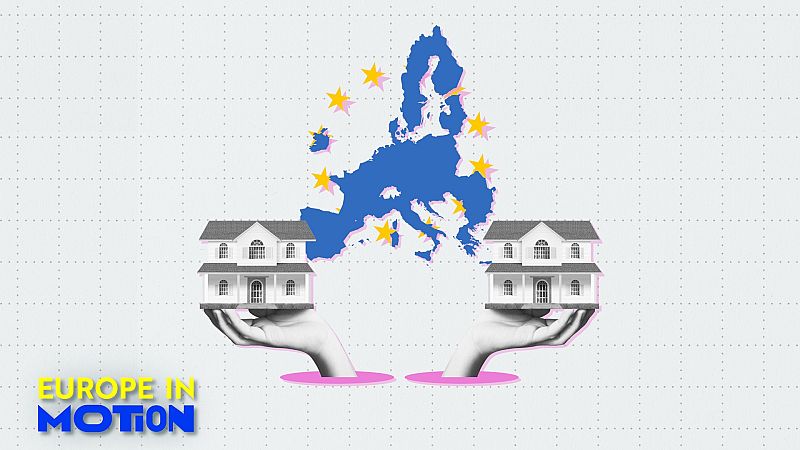Which EU countries lead in second-home ownership?

Many people dream of owning the house they live in, and for many Europeans, this dream has come true, as 69% of them are homeowners.
A quarter of this group even owns a secondary residence, according to the latest European Housing Trend Report published by international real estate company Re/Max.
Bulgaria is the European country with the largest share of homeowners who have a second home. Here, almost half (46%) of respondents own a second residence, which is significantly higher than the European average of 25%.
More generally, homeownership is strong in Bulgaria, with 80% of respondents owning at least one property, compared to the European average of 63%.
"This high level of property ownership is accompanied by a general contentment with their living situation, too, with 82% of Bulgarians reporting that they are happy with their current housing conditions," the report read. Across Europe, this figure is 76%.
In second place for the biggest share of homeowners with a second property is Greece (39%), followed by Croatia (37%).
On the opposite end of the spectrum lies the Netherlands, where fewer than one in 10 (8%) of homeowners have a second property, even though the share of respondents who found properties too expensive here stands at 57% — among the lowest figures in Europe.
"The Dutch show a higher willingness to relocate internationally, with 29% expressing a desire to move abroad for a more affordable life, compared to the 24% European average," the study noted.
In Ireland, just 11% own a second home. The report notes this is due to financial constraints. Here, 71% believe properties are too expensive.
"In Ireland, the overall housing situation appears challenging, with 18% of respondents dissatisfied with their current living conditions - the highest percentage among European countries," the report said.
"The main driver of this dissatisfaction is affordability, with nearly half (48%) of dissatisfied respondents citing it as a primary concern," it added.
For holidays and retirement
For many, the appeal of owning a second home tends to be more one of leisure than investment.
Nearly half of respondents with a secondary residence use it as a holiday home (44%), while a quarter of people (23%) will move there when they retire.
There are also practical purposes for owning a second home. These include renting it out either on a yearly contract (16%) or via short-term homestay platforms like Airbnb (16%). Others include it in their investment portfolio (14%) or use it to live between two cities (10%).
In 39% of cases across Europe, people have a second home in their main country of residence. Those living in colder climates, like Ireland (25%), are more likely to have a secondary residence abroad.
More than one-tenth (13%) of all homeowners who do not currently own a secondary property say they are likely to own one in the future.
"The appeal of secondary residences represents an investment in lifestyle, financial comfort and leisure," the report read. "And, despite a more challenging economic climate, the ambition to secure this dream remains strong for many on the continent, which will see secondary residences continue to play a significant role in the real estate markets of Europe."
Pushback against second homeownership
While second home ownership is traditionally commonplace in some countries, particularly around the Mediterranean, the growing cohort of high-net-worth investors is increasingly skewing the market.
The COVID lockdown years (2020-2022) increased second-home ownership, as people adopted new flexible lifestyles, with many seeking to divide their time between cities and the countryside, for example. The rise of remote working further bolstered this trend.
Across Europe, discontent with second-home ownership is mounting amid concerns about this fuelling rising property prices, the existence of ghost towns and overtourism.
Critics have said that in many countries, when someone with more disposable income owns a property in other locations, it has damaging social consequences for local communities. They argue this increases demand, artificially pushing house mortgages and prices to soar above what a local wage can afford.
This consequence is exacerbated when the second property is rented out through short-term homestay platforms.
In many places, such as Barcelona, the influx of tourists has also motivated landlords to move their units from traditional year-long leases to more lucrative short-term rental platforms. This results in a smaller supply of rental properties and higher prices.
"Where second homes are empty or only temporarily occupied in areas of high demand, tension naturally arises if there is a shortage of affordable options for households for whom the home would serve its primary function," Housing Europe Communications Director Alexandra Latham told Euronews.
Such phenomena have spurred tighter regulations on short-term holiday rentals and rising taxes on second homes.
Some cities, for example, are imposing tighter restrictions on short lets. Barcelona took this a step further and has banned short-term rentals as of April 2025. By 2028, existing licenses will not be renewed.
Meanwhile, France, for example, has introduced a series of measures in certain regions to control the number of second homes to combat rental platforms, but also the shortage of housing and the difficulty of buying for first-time buyers.
Today

